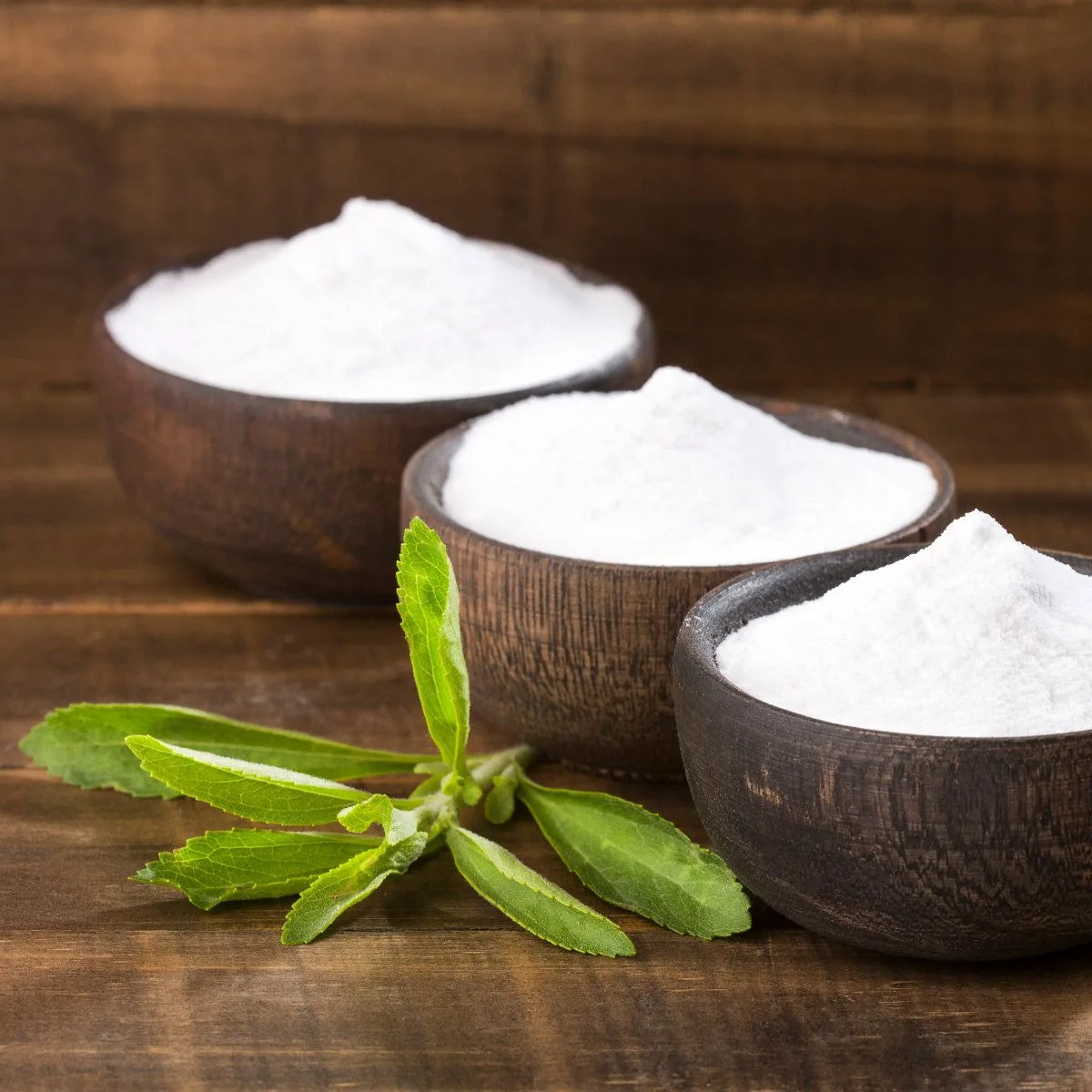Stevia, derived from the leaves of the Stevia rebaudiana plant, is a natural sweetener that has been used for centuries by indigenous peoples in South America.
In recent decades, it has gained global popularity, particularly among those looking to reduce their sugar intake without sacrificing sweetness.
The active compounds in stevia, primarily stevioside and rebaudioside A, are responsible for its intense sweetness, which can be up to 300 times sweeter than sugar.
The Rise of Stevia in Modern Diets
In recent years, I’ve seen the shift towards natural products, and stevia is no exception.
Its appeal lies in its natural origin and the fact that it does not contribute to calorie intake, making it an attractive option for weight management and diabetes control.
However, like any substance we consume, it’s crucial to understand both its benefits and potential downsides.
Gastrointestinal Effects
Discomfort and Digestive Issues
One of the most commonly reported side effects of stevia consumption is gastrointestinal discomfort.
Some individuals experience bloating, gas, and diarrhea after consuming stevia-sweetened products.
This can be particularly true for those who consume it in large quantities or are sensitive to sugar alcohols, which are sometimes used in conjunction with stevia in commercial products.
The body metabolizes steviol glycosides differently from other sugars.
They are not absorbed in the upper gastrointestinal tract and instead are broken down by bacteria in the colon. This fermentation process can lead to the production of gas and other byproducts that cause discomfort.
The Role of Gut Microbiota
The gut microbiota plays a significant role in our overall health, influencing everything from digestion to immune function.
There is some evidence to suggest that stevia may alter the composition of gut bacteria, potentially leading to dysbiosis.
Dysbiosis, an imbalance in the gut microbiota, has been linked to various health issues, including gastrointestinal problems and metabolic disorders.
Research indicates that while short-term consumption of stevia does not significantly impact gut bacteria, long-term effects remain unclear.
More studies are needed to fully understand how stevia interacts with our gut microbiota and what implications this might have for long-term health.
Individual Sensitivities
It’s important to recognize that individual responses to stevia can vary widely.
Some people may experience significant digestive issues, while others might not notice any adverse effects.
Factors such as overall diet, gut health, and genetic predispositions can influence how one reacts to stevia.
Metabolic Effects
Impact on Blood Sugar and Insulin Levels
One of the primary reasons people turn to stevia is its purported benefits for blood sugar management.
Unlike sugar, stevia does not raise blood glucose levels, making it a suitable alternative for people with diabetes. However, the impact of stevia on insulin levels is more complex.
Some studies suggest that stevia might enhance insulin sensitivity, potentially offering benefits for metabolic health. However, other research indicates that stevia could trigger an insulin response despite the absence of glucose.
This paradoxical effect could be due to the body’s anticipatory response to the sweet taste, expecting sugar intake and releasing insulin in preparation.
Potential Effects on Metabolic Rate
Another area of concern is the potential impact of stevia on metabolic rate.
Some research suggests that non-nutritive sweeteners like stevia might interfere with the body’s natural ability to regulate energy balance and metabolism.
This could theoretically lead to weight gain or difficulties in weight management, although more research is needed to confirm these effects.
Long-Term Metabolic Health
The long-term implications of stevia consumption on metabolic health remain an open question.
While short-term studies generally show no adverse effects, the potential for subtle changes in metabolism and insulin dynamics warrants further investigation. As with any dietary component, moderation and a balanced approach are key.
Allergic Reactions
Incidence of Allergic Reactions
While rare, allergic reactions to stevia have been reported.
These reactions can range from mild to severe and may include symptoms such as itching, hives, and swelling.
In extreme cases, anaphylaxis, a life-threatening allergic reaction, can occur.
Identifying Allergic Responses
Allergic reactions to stevia are likely due to hypersensitivity to one of its compounds.
Identifying an allergy can be challenging, as symptoms may not appear immediately and can vary in intensity.
If you suspect an allergy to stevia, it is essential to consult with a healthcare professional for proper diagnosis and management.
Managing Allergies
For those with confirmed stevia allergies, avoidance is the best strategy.
This means reading food labels carefully, as stevia can be found in a variety of products, including beverages, snacks, and even some medications. Alternative natural sweeteners, such as monk fruit or erythritol, may be suitable substitutes.
Hormonal Effects
Influence on Hormone Levels
There is ongoing debate about the potential hormonal effects of stevia.
Some animal studies suggest that high doses of stevia could influence hormone levels, particularly reproductive hormones.
For example, studies on rodents have shown changes in testosterone and estrogen levels with chronic stevia consumption.
Human Studies and Hormonal Impact
Human studies on the hormonal effects of stevia are limited and often yield conflicting results.
Some research indicates no significant impact on hormone levels, while others suggest possible alterations in hormonal balance.
Given the current evidence, it’s difficult to draw definitive conclusions, but it’s an area worth monitoring.
Considerations for Specific Populations
Certain populations, such as pregnant or breastfeeding women, might need to be particularly cautious with stevia consumption.
While there is no conclusive evidence to suggest harm, the potential for hormonal disruption warrants a careful approach.
Consulting with a healthcare provider can help determine the best course of action based on individual circumstances.
Cardiovascular Effects
Effects on Blood Pressure
Stevia has been traditionally used for its purported cardiovascular benefits, particularly in relation to blood pressure.
Some studies suggest that stevia may have a blood pressure-lowering effect, which could be beneficial for individuals with hypertension.
The mechanism is thought to involve the relaxation of blood vessels and diuretic properties.
Conflicting Evidence
However, the evidence is not entirely consistent.
While some studies support the blood pressure-lowering effects of stevia, others find no significant impact.
This inconsistency might be due to variations in study design, population characteristics, and the forms of stevia used.
Long-Term Cardiovascular Health
The long-term effects of stevia on cardiovascular health are not fully understood.
While short-term use appears safe for most people, more research is needed to determine the potential benefits or risks associated with chronic consumption.
As always, maintaining a heart-healthy lifestyle involves a combination of factors, including diet, exercise, and regular medical check-ups.
Neurological Effects
Impact on Mood and Cognitive Function
The potential neurological effects of stevia are an emerging area of interest.
Some research suggests that non-nutritive sweeteners, including stevia, might influence mood and cognitive function.
The proposed mechanisms include alterations in gut-brain signaling and changes in neurotransmitter levels.
Animal Studies and Human Implications
Animal studies have shown that stevia can affect the brain’s reward system, which could theoretically influence behavior and mood.
However, translating these findings to humans is complex, and current evidence is insufficient to make definitive claims about the neurological effects of stevia.
Practical Considerations
For those concerned about the potential neurological effects of stevia, moderation is key.
Paying attention to how your body responds to stevia and discussing any concerns with a healthcare provider can help ensure that your consumption is both enjoyable and safe.
Takeaway
Stevia offers a natural, zero-calorie alternative to traditional sugars and artificial sweeteners, appealing to those looking to reduce sugar intake and manage weight. However, like any dietary component, it is not without potential side effects.
Gastrointestinal discomfort, metabolic changes, allergic reactions, hormonal effects, cardiovascular implications, and possible neurological impacts are all areas worth considering.
In my experience, the key to incorporating stevia into your diet is moderation and mindfulness.
Paying attention to your body’s responses, staying informed about the latest research, and consulting with healthcare professionals can help you make the best choices for your health.
